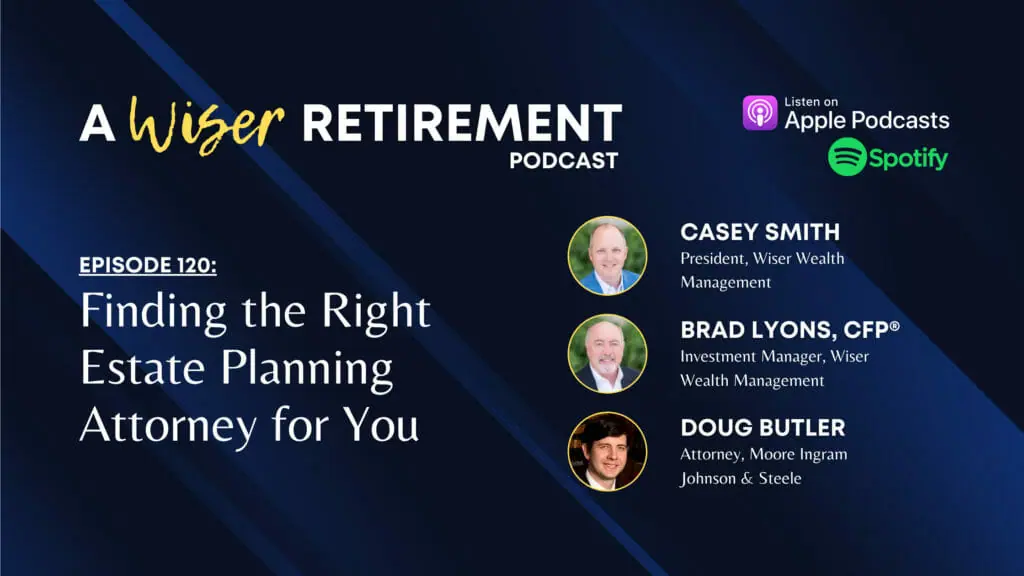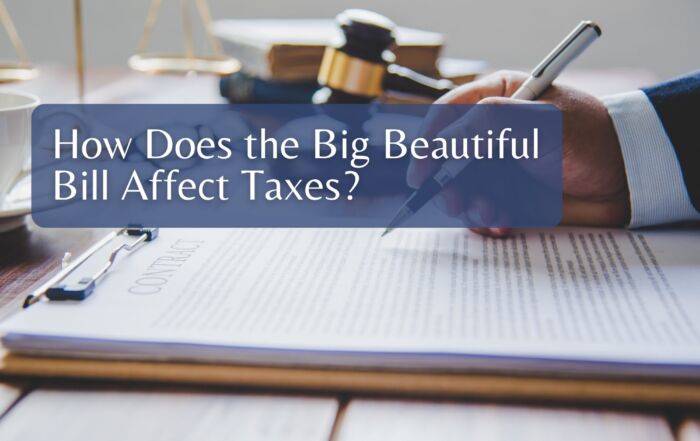
Finding the Right Estate Planning Attorney for You
On this episode of A Wiser Retirement Podcast, Casey Smith and Brad Lyons, CFP® are joined by Doug Butler who is an Attorney at Moore Ingram Johnson and Steele. Doug is a partner within the firm’s Corporate and Transactional, Insurance Regulatory, and Self-Insured/Captive Insurance Departments. They talk about how to find the right estate planning attorney for you.
Listen on Apple Podcasts or watch on YouTube:
SUMMARY:
What to Look for in an Estate Planning Attorney
Start by doing research on estate planning attorneys in your area. Look for attorneys who are experienced in your needs. Make sure they have a team to assist them in their processes. This will help your deadlines to be met promptly. Try to choose a larger firm because they are often more responsive. Keep in mind, solo practitioners don’t have the same resources and their process will often be time consuming. After you choose an estate planning attorney, schedule a consultation to see if the firm will be the right fit for your needs. Most firms offer a consultation free of charge!
Why is having an estate planning attorney important?
It’s important to meet with an estate planning attorney every four years. This will help you to reevaluate your plan because a lot can change in a few years. A few things that might trigger a new course of action include: a move to a new state, new tax laws, asset growth, or even a fallout within a family. Estate planning attorneys can also give instruction on how to handle a probate if a loved one passes away unexpectedly.
If you have homes in multiple states, should you have multiple power of attorneys in each state?
The short answer is no. You should have those decisions made in the state that you reside. However, it is important to properly manage your assets in other states. A good option is putting some assets into a revocable trust because it could help you to avoid the probate process.
Positive Attributes of an Estate Planning Attorney
A good estate planning attorney will explain the processes fully and be very detailed so the client can understand how each process works and how their needs are being met. Some attributes of a good estate planning attorney include being meticulous, client-focused, and prompt.
How can a family covenant assist in estate planning?
It is important to have a family covenant so you can identify your family’s mission statement. Although, it is not legally binding, an estate planning attorney can assist you in creating one. They can also help you explain, in your will, how you would like your loved ones to spend the money you leave behind.
Is it appropriate to bring the beneficiaries into the process?
Oftentimes, the process of choosing beneficiaries is very private. However, every situation is different. If you feel comfortable and want to let the beneficiary know of their responsibility, it can be beneficial. It can help the beneficiary handle the situation and not be taken back by it.
Creating a Will to Leave a Legacy
In a will, you won’t see much of an explanation from your loved one. However, you can customize your letter of instructions to explain to your loved ones why you have allocated your assets the way you have. It is also an opportunity to share your last thoughts with your beneficiaries. This will help with the grieving process and mitigate family conflict.
Download our white paper on “7 Steps to Leave a Financial Legacy”
TIMESTAMPS:
0:00 Intro
5:51 or 13:55 What to Look for in an Estate Planning Attorney
10:00 Why is having an estate planning attorney important?
15:03 If you have homes in multiple states, should you have multiple power of attorneys or medical directives in each state?
18:54 Positive Attributes of an Estate Planning Attorney
25:40 How can a family covenant assist in estate planning?
27:18 Is it appropriate to bring the beneficiaries into the process?
37:58 Creating a Will to Leave a Legacy
LINKS:
Learn more about Casey Smith and connect with him on Twitter.
Learn more about Brad Lyons, CFP®.
Learn more about Doug Butler.
CONNECT:
Twitter, Instagram, Facebook, LinkedIn, and YouTube.
Learn more about A Wiser Retirement podcast and access previous episodes.
Share This Story, Choose Your Platform!
Wiser Wealth Management, Inc (“Wiser Wealth”) is a registered investment adviser with the U.S. Securities and Exchange Commission (SEC). As a registered investment adviser, Wiser Wealth and its employees are subject to various rules, filings, and requirements. You can visit the SEC’s website here to obtain further information on our firm or investment adviser’s registration.
Wiser Wealth’s website provides general information regarding our business along with access to additional investment related information, various financial calculators, and external / third party links. Material presented on this website is believed to be from reliable sources and is meant for informational purposes only. Wiser Wealth does not endorse or accept responsibility for the content of any third-party website and is not affiliated with any third-party website or social media page. Wiser Wealth does not expressly or implicitly adopt or endorse any of the expressions, opinions or content posted by third party websites or on social media pages. While Wiser Wealth uses reasonable efforts to obtain information from sources it believes to be reliable, we make no representation that the information or opinions contained in our publications are accurate, reliable, or complete.
To the extent that you utilize any financial calculators or links in our website, you acknowledge and understand that the information provided to you should not be construed as personal investment advice from Wiser Wealth or any of its investment professionals. Advice provided by Wiser Wealth is given only within the context of our contractual agreement with the client. Wiser Wealth does not offer legal, accounting or tax advice. Consult your own attorney, accountant, and other professionals for these services.





